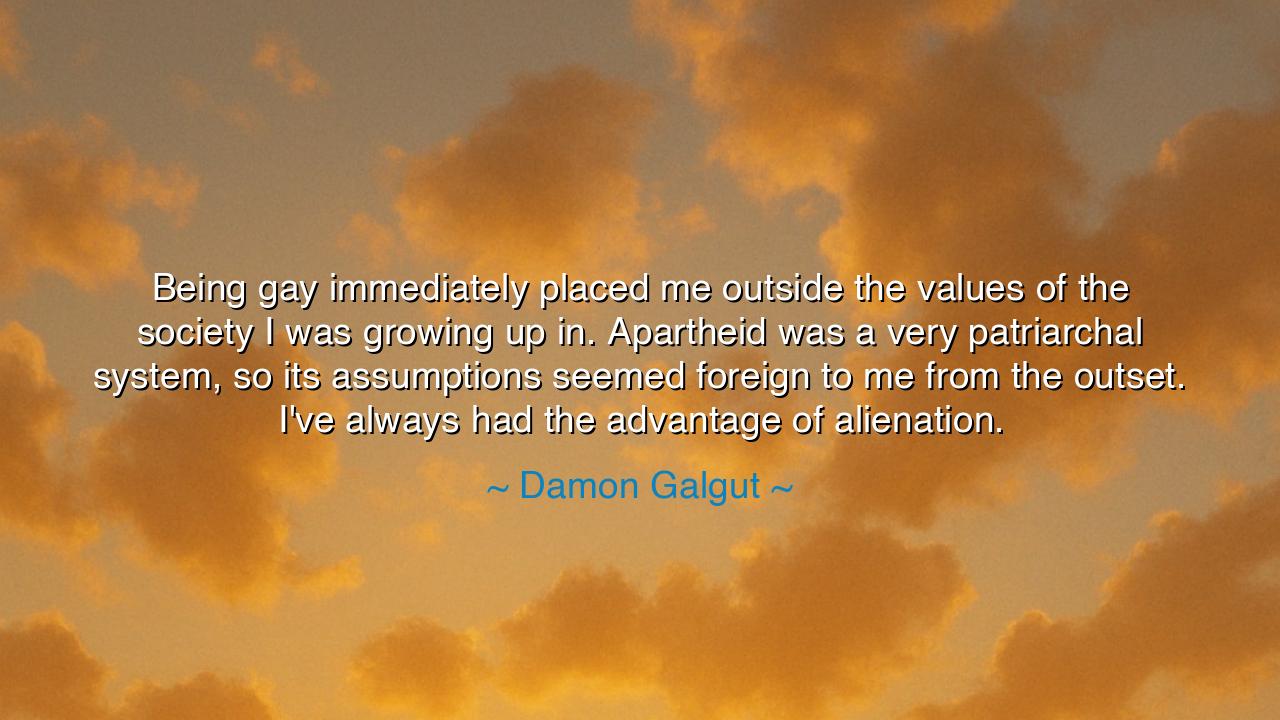
Being gay immediately placed me outside the values of the society
Being gay immediately placed me outside the values of the society I was growing up in. Apartheid was a very patriarchal system, so its assumptions seemed foreign to me from the outset. I've always had the advantage of alienation.






The words of Damon Galgut, “Being gay immediately placed me outside the values of the society I was growing up in. Apartheid was a very patriarchal system, so its assumptions seemed foreign to me from the outset. I've always had the advantage of alienation,” speak as both confession and wisdom. In them lies the paradox of the outsider: the pain of being cast apart from the dominant order, and the strength born from that very distance. Galgut, a South African novelist shaped by the shadows of apartheid, reveals that alienation, though bitter, became for him a kind of gift—a vantage point from which to see the falsehoods of a system others accepted without question.
The origin of these words is rooted in South Africa’s darkest days, when apartheid, that cruel and rigid system, divided human beings by race and imposed a patriarchal order that sought to suffocate individuality. To be gay in such a society was not simply to live differently; it was to stand beyond its sanctioned values, to dwell at the margins. Yet in those margins, Galgut found clarity. What others accepted as natural—the hierarchies of race, the dominance of men, the silencing of dissent—appeared to him already foreign, already hollow. Thus his very exclusion gave him the ability to see truth more sharply than those enthralled by the illusion of belonging.
History offers us many such examples where alienation became advantage. Consider the story of James Baldwin, the African American writer and intellectual. As a Black man and as a gay man in mid-20th century America, he lived at the edges of a society steeped in racism and conformity. Yet from that place of exclusion, Baldwin spoke truths about race, sexuality, and freedom that few within the mainstream dared to utter. His alienation gave him the piercing eye of prophecy; he saw the cracks in the American dream and forced the nation to confront its hypocrisy. Like Galgut, Baldwin shows us that the exile often sees most clearly.
The meaning of Galgut’s words is not merely personal, but universal. Every society builds its walls of belonging and exclusion, deciding who is "inside" and who is "outside." Yet those who find themselves outside often gain a rare perspective: they see the assumptions, the myths, the unspoken rules that others mistake for truth. What seems natural to the powerful appears arbitrary to the marginalized. Thus alienation, though it wounds, also liberates. It grants the courage to question, the power to imagine alternatives, and the wisdom to refuse blind obedience.
There is a heroic strength in this position. To live outside the values of one’s society is to be tested, for the desire to belong is one of humanity’s deepest hungers. Yet those who endure learn to anchor themselves in inner truth rather than outer approval. They become voices of conscience, creators of new paths, challengers of injustice. Galgut calls this “the advantage of alienation,” and indeed, history shows that many of the great reformers, prophets, and artists stood apart from their societies before they transformed them.
The lesson for us, then, is twofold. If you find yourself alienated from your society—because of identity, belief, or conviction—do not despise this position. Though painful, it may be your greatest strength, granting you the vision to see what others cannot. And if you stand within the circle of belonging, do not dismiss the voices of the alienated, for they may be the very ones who reveal to you the truth your comfort hides. A society that silences its outsiders condemns itself to blindness; a society that listens to them opens the door to renewal.
Practical actions are clear: cultivate empathy for those pushed to the margins, and listen to their testimony with humility. If you live in alienation yourself, harness it not for bitterness but for creation—write, speak, build, and resist with clarity. Seek solidarity with others who live at the margins, for together the outsiders may become the builders of a new order. And for all, remember that the measure of a society’s greatness is not how it treats its insiders, but how it honors those who dwell at its edges.
Thus let Damon Galgut’s words endure: alienation can be an advantage, for it strips away illusion and grants the eye of truth. The outsider may suffer, but from that suffering comes wisdom. And those who embrace the wisdom of the alienated become not only witnesses to injustice, but architects of a freer and more human world.






AAdministratorAdministrator
Welcome, honored guests. Please leave a comment, we will respond soon